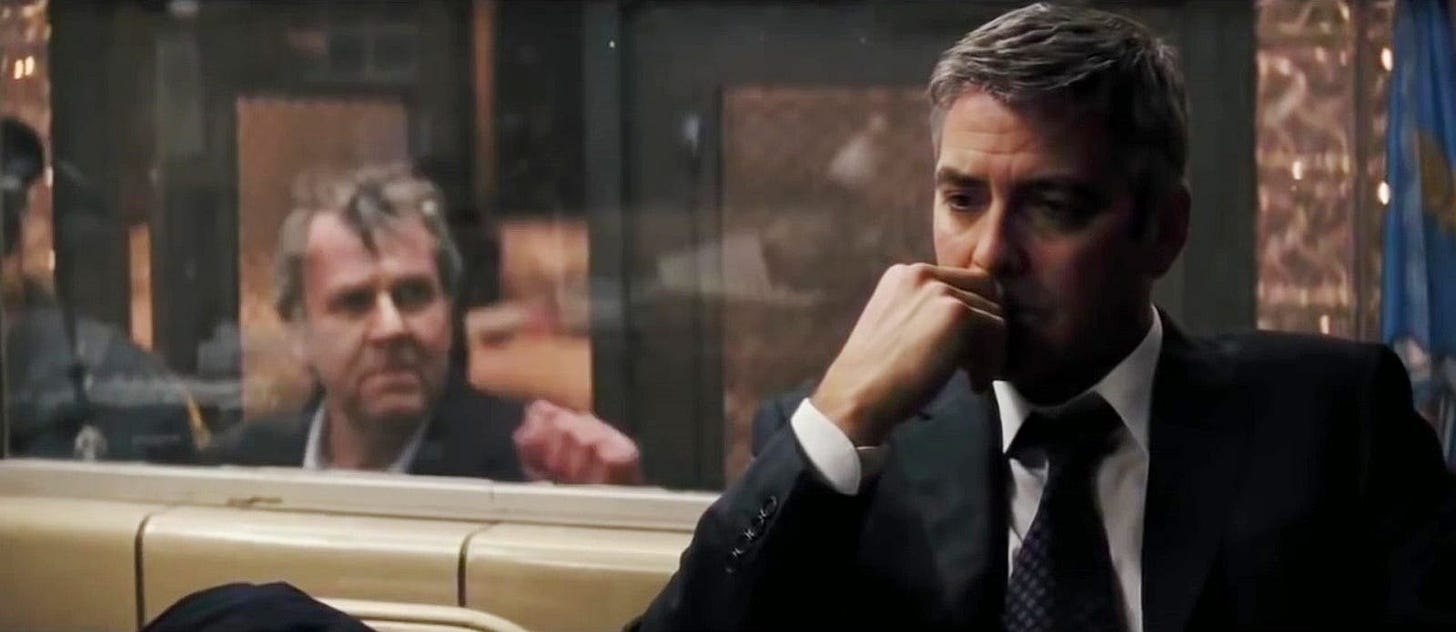The Metaphysics of Tony Gilroy's "Michael Clayton"
Can the truth be adjusted?
Truth has always been a source of - if not the primary -conflict between humanity and the world we inhabit. Many of us assert that there is some form of truth, and the vast majority of history seems to be a war between these forms.
This concept of warring forms claiming to represent truth, yet often functioning as tools of survival or control, is the beating heart of Tony Gilroy’s Oscar-nominated film Michael Clayton. Though marketed as a legal thriller, the film is a metaphysical drama about the quiet unraveling of a man caught between the machinery of institutional lies and the dormant reality of a moral being.
Truth as Commodity
In Michael Clayton, truth is never denied outright, it is merely contained through corporate structure that obfuscates its nature to gain control over its realm. This obfuscatory control is enacted through the ghosts of legal supervision that work behind the scenes, not to bring real truth to light, but to neutralize it.
The Man Who Fixes
Michael Clayton is one of those ghosts.
He’s not a lawyer in the courtroom. He’s a fixer. He exists in the margins, where systems begin to fray and reality starts leaking through the cracks. He’s summoned when truth threatens to surface. He arrives with just enough warmth to disarm and just enough detachment to disappear.
But this detachment costs him.
To maintain corporate agency, Michael must surrender his own. His life bears the scars - a failed marriage, a distant son, a shuttered business. He owns nothing. Not even himself.
His agency is being spent, not expressed. And this is the metaphysical conflict of the film:
To persist in unreality is to slowly disintegrate.
Arthur, the Mad Prophet
Arthur Edens, the manic-depressive partner at Michael’s firm, is the first to break the silence. He uncovers the criminal actions of UNorth and threatens to rupture the fragile lie holding their entire structure together.
He is an unhinged but true prophet figure. His name, even, evokes archetype: Arthur, the king, the voice of conscience that reverberates through the Garden of Eden.
In Arthur, the film presents a terrifying possibility. To truly see the world as it is, not as the system presents it, may cost your sanity.
Michael’s Awakening
Arthur’s death is the catalyst. It jolts Michael’s ghost-like existence toward consciousness. And the film’s climax, fittingly, is not explosive. It is existential.
He turns the system against itself, not out of heroism but necessity. The truth has revealed itself. It cannot be adjusted anymore. It demands alignment.
“I’m not the guy you kill. I’m the guy you buy.”
A line delivered with calm, terrifying precision. And then, seconds later, he refuses to be bought. He turns away from Karen Crowder, the executor of the lie, and opens himself to the consequences of truth.
Michael has reached a place of transcendence that goes beyond the loyalty of any material world.
Truth and Human Existence
So what is truth in this film? It is not a weapon. It is not a brand. It is not even a conclusion.
It is a threshold that one must adjust themselves to so that one might become fully human.
In the cosmology of Michael Clayton, to live within a lie is to remain in stasis, but to embrace the truth is to recover agency, identity, and dignity.
It is not merely a moral act. It is a metaphysical return to being itself.
It is that ultimate truth that can never change but merely be adjusted to from inside the hearts of men.
And it’s certainly something to think about when you are sitting in the back of a taxi cab.
Thank you for reading. As a heads up to my readers, I will be providing an extensive breakdown of the script for Michael Clayton in the form of what will likely be a 4-Hour lecture style video. My hopes are to assist you in your pursuit of your own writing, acting, or directing. This will be paywalled.
In the meantime, please share this article with those in your circle who might be interested in filmmaking.
There are 1000 things that could be discussed about this film and I hope to do so in that lecture. Feel free to jump over to my chat and hit me with any questions you might have about writing!




